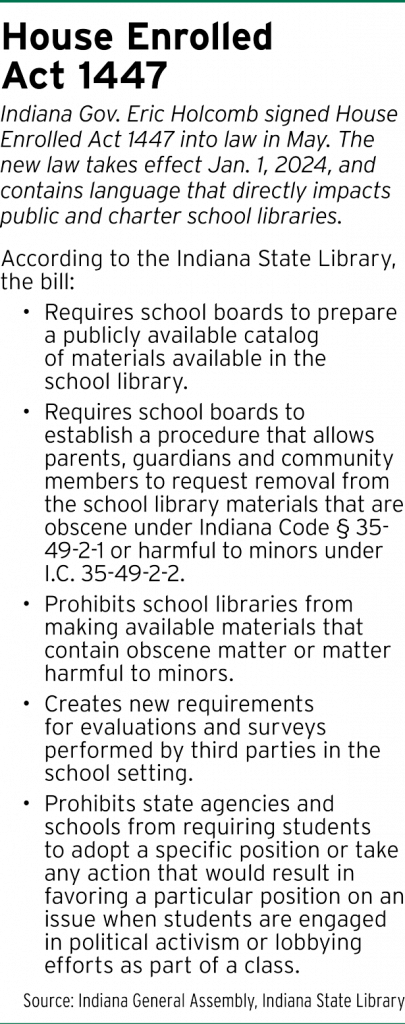Subscriber Benefit
As a subscriber you can listen to articles at work, in the car, or while you work out. Subscribe NowA new Indiana law set to take effect in 2024 has some public school librarians feeling uneasy, as the state has put in place procedures for challenging books and will require school libraries to prepare a publicly available catalog of materials.
Indiana Gov. Eric Holcomb signed into law House Enrolled Act 1447 in May.
The new law takes effect Jan. 1, 2024, and has language that directly impacts public and charter school libraries, but not private schools.
According to the Indiana State Library, the law requires Indiana school boards to establish a procedure that allows parents, guardians and community members to request removal from the school library materials that are obscene or harmful to minors.
It also prohibits Indiana school libraries from making available materials that contain obscene matter or matter harmful to minors.
The bill’s initial language revolved around guidelines regarding third-party vendors for analysis, evaluations or surveys in schools.

Chad Heck, Indiana Library Federation Advocacy Committee co-chair and a school librarian in Indianapolis, said language was inserted into HEA 1447 late in the 2023 legislative session regarding obscenity and establishing challenge processes.
According to the Indiana Capital Chronicle, both the Indiana House and Senate voted largely along party lines to allow library language to be inserted into House Bill 1447. The House tally was 69-28 and the Senate vote was 39-10.
Heck said bills with similar language had been defeated in recent legislative sessions.
He said librarians are concerned that the law is going to have a chilling effect on their collection development.
Heck also said the ILF is worried that librarians won’t be able to collect materials that are legal under state law.
“I think that’s our highest concern about this,” he said.
Librarians worry about law’s impacts
 An informational memo sent by the Indiana State Library to librarians in May also noted that Indiana law, with some specific exceptions, provides that it is a Level 6 felony to disseminate, display or perform material harmful to minors in an area where minors are exposed to such material.
An informational memo sent by the Indiana State Library to librarians in May also noted that Indiana law, with some specific exceptions, provides that it is a Level 6 felony to disseminate, display or perform material harmful to minors in an area where minors are exposed to such material.
“Historically, it has been a defense to prosecution if the matter was disseminated or performed for legitimate scientific or educational purposes. Additionally, it has historically been a defense if the matter was disseminated, displayed, or performed by a school or by an employee of such school acting within the scope of the employee’s employment,” the memo read.
According to the memo, as of Jan. 1, 2024, HEA 1447 removes as a defense that the material harmful to minors was provided for educational purposes. Additionally, it removes as a defense to prosecution that the material was provided to the recipient or performed by a school.
Heck said the new law, as it pertains to material that is considered obscene or harmful to minors, is interesting, because those books are already illegal for libraries to have in the first place.
He also said school districts have challenge processes in place.
Vanessa Martin, ILF’s advocacy co-chair and a public librarian in Greensburg, said the new law creates “a chilling effect” on school libraries when curating their collections.

Martin opined that the law puts an undue burden on school librarians to make their catalogs available.
Feedback from other librarians indicates they’re fearful they could be taken to court for purchasing a book, Martin said.
“These librarians are afraid to buy certain titles because they’re afraid of getting in trouble,” she said.
Further, Martin said she has heard anecdotally that some librarians have had administrators already telling them to take books off the shelves before there’s even been a challenge by a community resident.
Bill supporters, opponents clash on need for new law
Rep. Donna Schaibley, R-Carmel, authored HEA 1447. Through an email from her press secretary, Schaibley declined an interview request from Indiana Lawyer.

Sen. Jim Tomes, R-Wadesville, co-authored Senate Bill 12 in 2023, which had similar language to HEA 1447.
At a Feb. 15 meeting of the Indiana Senate Judiciary Committee, Tomes described the proposed legislation as a measure that was directed toward students in grades K-12.
“(We’re) trying to prevent that age of students from being exposed to books that are absolutely raw pornography,” Tomes told the committee.
That bill passed through the Senate by a 37-12 vote but didn’t get a vote in the House.
HEA 1447 is mentioned in the preamble to the fourth iteration of the Parents’ Bill of Rights that was released in August by Attorney General Todd Rokita’s office.
“The passage of HEA 1447 was an excellent first step toward removing inappropriate books from our children’s school libraries. The law requires schools to post a catalog of all library books on their websites. If a parent finds a book objectionable, the law allows parents to request its removal through the local school board,” Rokita wrote.

Sen. Fady Qaddoura, D-Indianapolis, said the passage and signing into law of HEA 1447 is not an isolated incident but is rather part of a larger political strategy to censor diverse communities.
“We see this book censorship as just another component of a cultural war,” Qaddoura said, adding that the law has nothing to do, in his opinion, with parental rights.
The Democratic lawmaker also said the state and students need literature that allows them to become critical thinkers.
Book challenges
Heck said this is his 16th year in the school district where he works.
He said he’s never faced a formal challenge to a book, nor have most libraries.
A lot of the books being challenged nationally have LGBTQ+ themes or address racial themes/issues, Heck said.
The American Library Association has a list of books that were most challenged in 2022.
It documented 1,269 demands to censor library books and resources in 2022, which the ALA described as the highest number of attempted book bans since it began compiling data about censorship in libraries more than 20 years ago.

Kent Frandsen, senior counsel with Parr Richey Frandsen Patterson Kruse LLP, has represented school districts for more than 40 years. He currently represents two school districts.
Frandsen said he has never had a situation where there was an official challenge to a book.
“It’s just another example of a law that gets enacted in search of a problem,” he said of HEA 1447.
Also, Frandsen said he suspects most school districts already have a policy or procedure for dealing with parent or community complaints about library books.
He said the new law probably doesn’t require significant changes in those policies.
But it increases the chances of school personnel becoming embroiled in a local controversy, and that’s the last thing schools want, he said.
Frandsen said some smaller, rural school districts have a combined junior-senior high school with a single library that serves students as young as 12 and as old as 19.
“With such a wide age range, librarians may have difficulty in deciding on what books are appropriate for all,” he said. The fear of being charged with a crime may influence those judgment calls.”
The problem with the new law, Frandsen opined, is it could take time and money away from the mission of educating students.
“Folks often complain about the number of school administrators, but this is another example of why administrative costs rise,” he said.•
Please enable JavaScript to view this content.
